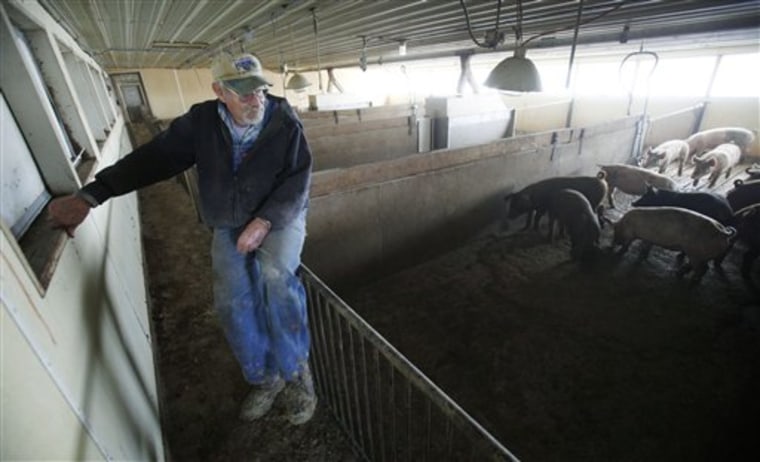Like the virus itself, the name “swine flu” is spreading quickly. For the pork purveyors and hog farmers who make up the nation’s $15 billion pork industry, that’s a disaster.
It doesn’t seem to matter that the strain may not come entirely from pigs and cannot be spread by eating pork. Hog prices are already dropping as financial markets worry people will have second thoughts about buying “the other white meat.”
“It’s killing our markets,” said Francis Gilmore, 72, who runs a 600-hog operation in Perry, outside Des Moines, and worries his small business could be ruined by the crisis. “Where they got the name, I just don’t know.”
The swine flu strain that is spreading is a never-before-seen hybrid of human, swine and bird influenza but is widely known as swine flu. Though it is suspected of killing more than 150 people in Mexico, public health officials have said eating products like bacon, ham and pork chops is safe as long as the meat is cooked thoroughly.
Still, the outbreak has depressed the U.S. pork industry. China, Russia and Ukraine have banned pork imports from Mexico and parts of the United States, and the outbreak has stalled the usual spring rise in U.S. hog prices.
Hog prices nationwide had dropped to an average of about $59 per 100 pounds of carcass weight Tuesday morning, down from about $62 last Thursday, according to the U.S. Department of Agriculture. Prices typically climb past $70 in late April and May.
“It is an unfortunate use of words,” said Dave Warner, a spokesman with the National Pork Producers Council. “It does trouble us from that standpoint because it’s very much a public health issue right now and there’s no indication that a pig gave it to a human. To call it a ‘swine flu’ I think is a little bit misleading.”
U.S. officials said Tuesday they may abandon the term swine flu, for fear it’s confusing people into thinking they could catch it from pork.
“We’re discussing, is there a better way to describe this that would not lead to inappropriate actions on people’s part?” said Dr. Richard Besser, acting director of the Centers for Disease Control and Prevention. “In the public, we’ve been seeing a fair amount of misconception ... and that’s not helpful.”
The European Union’s health commissioner has suggested the virus be renamed “novel flu.”
Marie Gramer, an assistant clinical professor at the University of Minnesota College of Veterinary Medicine who advises the National Pork Board, suggested that the virus be named based on the geography of the outbreak: North American influenza. She said that would be more accurate than pinning the name on the genetic ancestry of the virus.
“It’s just like looking at me and my heritage. Someone could look at a gene of mine and say, ‘Oh, she’s Czechoslovakian,’ even though I was born and raised in Minnesota. To refer to me as from Czechoslovakia would be incorrect,” Gramer said.
U.S. agricultural officials also favor a name change. Agriculture Secretary Tom Vilsack points out that the virus is not food-borne and has nothing to do with consuming pork products.
Vilsack says he’s concerned that misunderstandings could have a negative impact on farmers who provide pork products to consumers around the world.
Speaking Tuesday at a daily news briefing on the government’s response to the outbreak, Vilsack said the American hog industry is sound and that consumers everywhere should know that U.S. pork products are safe.
The World Health Organization indicated it had no plans to try to remove the term “swine” from the flu’s name.
“This epidemic started, basically, with that name, and the virus that is identified is the swine influenza virus,” said WHO’s assistant director-general Keiji Fukuda. “And we are hopeful that the introduction of new names doesn’t cause any undue confusion.”
MaryBeth Winstead, who was shopping at a Harris Teeter supermarket in Raleigh, N.C., said she probably wouldn’t be putting pork on her grocery list as the outbreak unfolds.
“I haven’t really done a lot of research on it yet,” the 44-year-old Winstead said. “We normally take caution. But it’s not like I’m going to cook it anytime soon.”
At a Kroger store in Charleston, W.Va., Sondra Meadows, 69, loaded two packages of pork chops into her shopping cart. “Once it’s cooked, I don’t see how it could possibly hurt anyone,” she said. “Not buying pork is sort of ridiculous, I think.”
To put customers at ease, hog producers have ramped up efforts to show that their operations are clean. That includes urging farmers to increase handwashing, restrict visitors, block outside clothing from being worn near the animals, preventing birds from interacting with pigs and separating hogs that come from multiple sites.
But it might be too late to shut the barn door on the term swine flu.
“It’s just a very negative, onerous and really incorrect appellation that we’re going to have to live with,” Dr. Tom Ray, a veterinarian and North Carolina director of livestock health.
